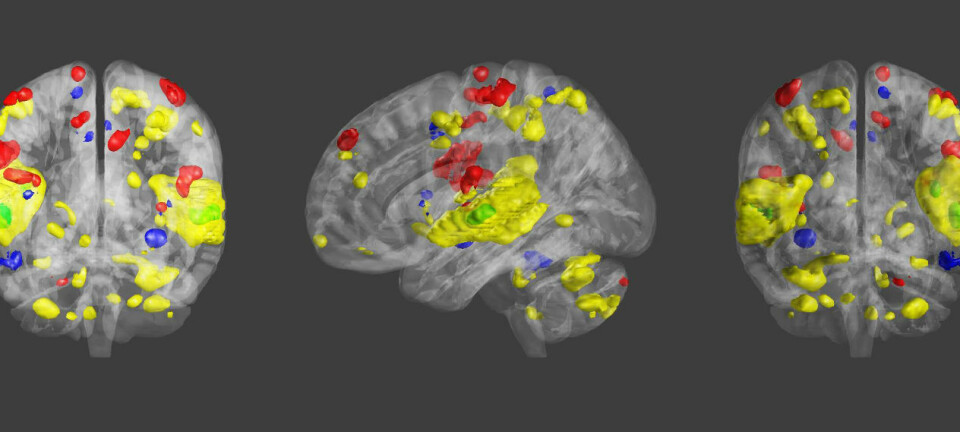
Musicians still flock to traditional recording companies
Although artists can now record and sell their own music digitally, aspiring musicians still cling to the skirts of the traditional music industry.
Denne artikkelen er over ti år gammel og kan inneholde utdatert informasjon.
This traditional stance was revealed in a study of aspiring artists in the current musical landscape, carried out by Hendrik Storstein Spilker.
Spilker, an assocoate professor of the Department of Sociology and Political Science at the Norwegian University of Science and Technology (NTNU) in Trondheim, has interviewed musicians about the network studio trend.
This technology enables musicians to sit at home with their computer and given the right software produce music nearly matching the quality of a costly professional studio. They can spread their music globally on the web and accumulate a following of fans much more directly.
It’s been predicted – in the media and in research literature – that such homespun musical production would wipe out the traditional recording companies, in part because artists get more immediate contact to their public and more freedom of expression.

But it isn’t necessarily so, if we can give credence to Spilker’s interviewees:
“Our artists are far more conservative than you would expect and the album still holds sway. The new technologies are much less threatening for the established music industry than the media would have us believe,” he says.
A taste for success
“There’s been so much media hype about the new music publication trend taking over, and this has been swallowed rather uncritically as a premise in research literature,” says Spilker.
The researcher relates that special cases, such as the band Arctic Monkeys, have been cited time and again as proof of the demise of recording companies.

The British band cultivated a large following and packed concert halls long before getting any record contracts or distributing music through traditional channels. Thomas Dybdahl and Bon Iver are two other examples who broke through with home-made albums – respectively That Great October Sound and For Emma, Forever Ago.
But these success stories don’t seem to be inspiring musicians in the making, as Spilker calls them.
“The new types of production and distribution tend to be like test arenas, playgrounds, whereas the real life as an artist is materialising elsewhere,” he says.
“It’s clear that these artists want to enter the traditional system.”
The right connections still most important
The persons he interviewed were serious musicians from the Trondheim area, trying to break through into the business but so far without much success.
“It’s a stimulating group to study because they’re so ambitious. It’s interesting to see how they make use of the new technological opportunities,” says Spilker.
Or rather, don’t make use of them, if we can take the artists at their word.
Spilker says these aren’t cases of burnt children dreading the fire. It’s not as if they’ve tried the network model, failed, and then elected for the tried and true alternatives.
“They haven’t carefully weighed the alternatives as far as I can tell. As I interpret it, they have strong preconceptions, an unshakeable mental model, about what makes an artist. The main thing for them is to know the right people and gain recognition from someone important.”
Practical considerations
Although the symbolic value of belonging to the traditional industry appears to be the strongest argument for using professional recording studios, the musicians had some practical reasons as well.
One thing is that the music industry generally does have better recording equipment in their studios.
The interviewed musicians also said they felt uncomfortable about posting music made at home on the internet because they’d accessed and used illegally downloaded software.
Spilker has interviewed musicians in connection with the project Pandora’s iPod, which looked into the relationship between music and morals in a modern digital world.
The result was published in the late spring in the International Journal of Communications.
An album is the trademark of a real artist
Spilker reveals another paradox found in the study is the prevailing position of the album.
“According to musicians, an essential symbolic line is crossed with the release of a first album. This is the debut that enables them to call themselves a real artist,” he says.
“Paradoxically, this is in a day and age when you hardly find any record stores, and where streaming individual songs is becoming increasingly common. This would make you think the album is a superfluous format, that there’s room now for both shorter and longer formats, and more flexible and fluid cycles for releasing music. But that isn’t the case.”
Getting adapted
The music industry has been running on hardscrabble roads in the last decade. Consumers have turned away from CDs, digital music emerged on the internet before the industry had any business model allowing them to profit from it, and pirate downloading became nearly the norm.
Those involved – record companies, artists and consumers – have often been at loggerheads. Thirteen recording companies tried to sue LimeWire for up to $75 trillion.
That’s more money than the combined music industry has earned in its entire history.
Consumers and the industry are still not marching in step, but Spilker thinks the biggest confrontations are over for now.
“We’re starting to see the stabilisation of a new reality in the music trade, where record stores are rare and streaming plays a central role. It still hasn’t coalesced and it will take a few years of adaptation, trial and error, but the worst turbulence from the last decade has subsided,” says the researcher.
----------------------------
Read the Norwegian version of this article at forskning.no
Translated by: Glenn Ostling

































